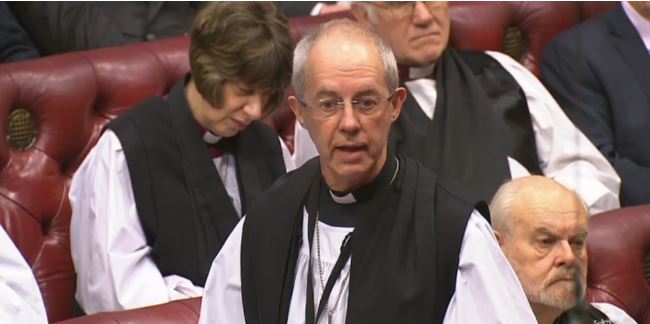Archbishop Of Canterbury: British Values Are Based On 'Threat And Fear'
The Archbishop of Canterbury has criticised the government's 'British values' as he said neither democracy nor the rule of law answers problems of division and hatred in the UK.
Justin Welby led a debate in the House of Lords on Friday discussing "shared values underpinning our national life". He said the Home Office definition of "fundamental British values" is based on a "revisionist secularism notion of our national identity" and is "increasingly disconnected" from the UK's history.

The threat of violent extremism and immigration led to the government's desire to define British values, he said. But Welby warned: "Values built on feelings of threat and fear can lead us down a very dangerous path."
He said they could lead to us "turning inwards" and "strangled the hope of the common good".
Welby referred to "great times of change in mood and culture" in the UK after Brexit and Trump's election to the presidency and said it demands "a re-imagining of what we are about".
The government defines fundamental British values as "democracy, the rule of law, individual liberty and mutual respect for and tolerance of those with different faith and beliefs and for those without faith".
But Welby said these were reductive and "not properly embedded in the heritage of our country" which was based on Christian teaching. He said values such as democracy and the rule of law are not "the final answer" to problems of hatred and division.
Welby pointed to Martin Luther King Jr and Archbishop-emeritus of Cape Town Desmond Tutu as examples of people who did not accept the rule of law when it was unjust.
He called for a rediscovery of "deep values" and "a more beautiful and better common narrative that shapes and inspires" us.
"Our values have not emerged from a vacuum but from the resilient and eternal structures of our religious, theological, philosophical and ethical heritage," he said.
Welby was praised for a "timely debate" by other peers and it comes after he said he would be an extremist under the government's definition.
In an address earlier this month he said government officials knew so little about faith they assumed everyone who is religious is "bonkers". He said he had had a "robust" exchange with a senior politician over bishops' reluctance to support the "British values" definition.
Welby said under the government's definition of extremism he would be guilty because he believed his faith was more important than the rule of law.
"We do not believe as Christians that the rule of law outweighs everything else, we believe that the kingdom of God outweighs everything else."











